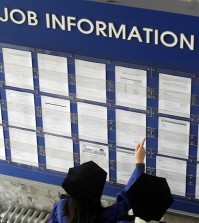- California Assembly OKs highest minimum wage in nation
- S. Korea unveils first graphic cigarette warnings
- US joins with South Korea, Japan in bid to deter North Korea
- LPGA golfer Chun In-gee finally back in action
- S. Korea won’t be top seed in final World Cup qualification round
- US men’s soccer misses 2nd straight Olympics
- US back on track in qualifying with 4-0 win over Guatemala
- High-intensity workout injuries spawn cottage industry
- CDC expands range of Zika mosquitoes into parts of Northeast
- Who knew? ‘The Walking Dead’ is helping families connect
S. Korean companies’ hiring practices frustrate jobseekers

Jobseekers wait in line for an interview at the Busan Exhibition and Convention Center (BEXCO) in this 2013 file photo. Seventy-four companies took part in the job fair to hire 510 job applicants. (Korea Times file)
By Lee Min-hyung
Many job applicants complain that companies change their hiring practices too often.
“I felt frustrated when I heard state-owned companies will change their hiring process,” said Lee Chung-hyup, who has prepared to apply for state-owned companies for more than a year. “I put all my efforts and money into getting a high TOEIC score and getting a computer and other certificates, but they became useless because public companies recently announced that they will not consider applicants’ ‘specifications’ such as language test scores.”
Lee, 27, said that only those with a bit of luck, regardless of their ability, can get a decent job under the current hiring system.
“One of my friends did not make much of an effort before applying for the same company as I did,” he said. “He passed the hiring process of the company, but I failed.
“I don’t understand why companies change their hiring process so often. I was embarrassed when I was informed that all of my efforts were wasted.”
Some state-owned companies, such as the Korea South-East Power Co. (KOSEP), adopted new hiring procedures this year, including the use of the National Competency Standards (NCS). The NCS is a test that evaluates how well applicants will likely adapt to the job.
One hundred public companies will hire people based on the NCS as of this year, and all the public companies have to use the NCS until 2017, according to the Ministry of Labor and Employment.
The government introduced the new hiring system to prevent applicants from getting unnecessary job specifications.
“I know the good intention of the new hiring process,” Lee said. “But no one knows when another hiring process will be introduced. I am very confused.”
The same goes for Ryu Yong-hyun, 29, who had been a jobseeker since 2012. After being out of work for about three years, he recently secured a job in the tobacco industry.
“I applied for more than 50 companies during the last half of 2014, and passed through the document screening phase at only five companies,” Ryu said. “But I was rejected by all of them after the first round of interviews.”
Applicants here have to pass a number of phases to get a job, including a document screening, first round interviews with officials at the working level and final interviews with corporate executives.
He said the toughest thing for him at that time was to prepare for various and totally new hiring processes at each company.
“There’s no consistency when companies hire people,” he said.
He felt it was almost impossible for him to predict the fast-changing hiring processes for all companies.
“Although I finally got a job, I hope my friends and even my offspring have a better life in the future, not worrying about confusing hiring processes,” he said.
About a half-million people failed to get a job last month, which was about a twofold increase year-on-year, according to recent data released by the Statistics Korea. The number was the highest in the nation’s history.
As manufacturing companies take up a large part of the domestic industry, it is difficult ― especially for those who studied humanities at university ― to land a job here.
“I graduated from a university in Seoul, but to be honest most companies here do not need applicants who studied humanities at a university.”
He believes the key to solving the current employment problem should begin with changing our attitudes towards education.
“Most people in Korea do not want to go to career colleges to learn job-related skills. They only seek to enter prestigious universities without considering their major or blueprints for the future. And I was also one of them.”













Pingback: aaron » The English phantasm